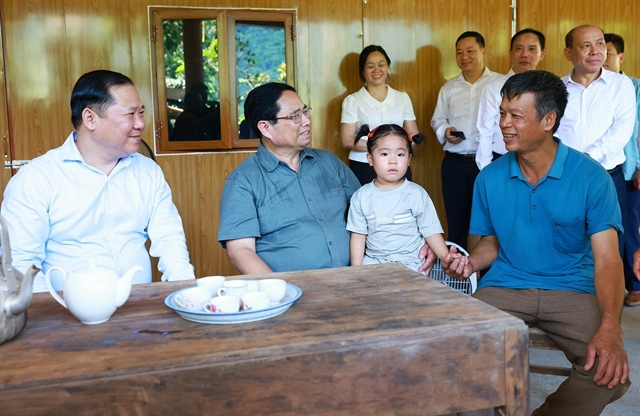Policy realises poor people’s dreams for sturdy houses
Society – Economy - Ngày đăng : 17:54, 09/10/2024
 |
| Prime Minister Phạm Minh Chính (second, left) visits a family in Hiền Lương commune in Đà Bắc district of Hòa Bình province. — VNA/VNS Photo |
HÀ NỘI — Replacing temporary and dilapidated houses with safe and sturdy ones is a meaningful and practical policy to help disadvantaged people enjoy better living conditions, reflecting the efforts by the entire political system in ensuring social welfare and leaving no one behind.
'Settling down and making a living' has been a goal for many people, especially poorer families, as well as those in disaster-prone, remote and mountainous areas. However, for many, it has remained a distant dream.
Data from the Ministry of Labour, Invalids and Social Affairs reveals that there are currently more than 153,000 temporary and dilapidated houses in need of rebuilding or repairs. To fund the construction, each new house would cost VNĐ50 million (US$2,000) and each upgrade of dilapidated houses would require VNĐ25 million, adding up to a total of VNĐ6.5 trillion needed, the ministry said.
Over the past decades, with the determination of the entire political system, many policies on housing support, especially for poor households across the country, have been implemented. Thanks to funding from the State budget, the community, businesses, organisations and individuals, many houses across the country have been built or upgraded, easing urgent housing needs.
From 2000 to 2023, more than 1.7 million houses were built or repaired for poor people and those with disadvantaged backgrounds.
House building and repairs are among the major policies of the Party and State - considered a regular political task comprehensively performed by the entire political system, from Party Committees, administrations and the Vietnam Fatherland Front Committees at all levels, to collectives, organisations, businesses and individuals.
Many practical projects have been launched to ensure that the poor have access to safe, solid houses, thereby creating good conditions for them to escape poverty.
This is also one of the large-scale social welfare programmes, with great humanitarian significance, demonstrating the superiority of the socialist regime, the spirit of mutual support, the aspiration to ease others' difficulties and sympathy for those less fortunate.
As part of the efforts to promote the policy, on November 24, 2023, the 13th Party Central Committee issued Resolution No. 42-NQ/TW on continuing to renovate and improve the quality of social welfare policies. The Resolutiuon sets the goal of "completely eliminating temporary and dilapidated houses for poor households, near-poor households, and people affected by natural disasters and climate change" by 2030.
On April 14, 2024, Prime Minister Phạm Minh Chính, Chairman of the Central Council for Emulation and Commendation, launched a movement calling on the whole nation to partner up to eliminate temporary and dilapidated houses by 2025. The Government leader requested that the administrations at all levels, sectors, localities, agencies, people and businesses across the country promote their activeness, creativity, and responsibility towards the community and society, especially the poor, striving to complete the task.
At a meeting between Cabinet members and the VFF, ministries, and agencies on October 1, on support for poor and near-poor households to build and repair houses, the PM called for a 450-day peak campaign to mobilise the synergy of the whole society for the work nationwide.
He specifically requested that ministries, sectors and local areas show high determination, great efforts, drastic actions, and thorough implementation of tasks, with a clear assignment of jobs and responsibility to specific individuals, ensuring that the campaign is implemented extensively, widely and substantively. Donations must be closely managed with strengthened supervision and examination, he said.
The policy has received strong public support. However, to effectively realise the movement, stronger engagement from all stakeholders is needed to spread good deeds, turning small contributions into large ones. This will help build more stable and safe houses for the poor, not only enabling them to escape poverty but also gradually improving their living standards and contributing to sustainable poverty reduction. — VNS
